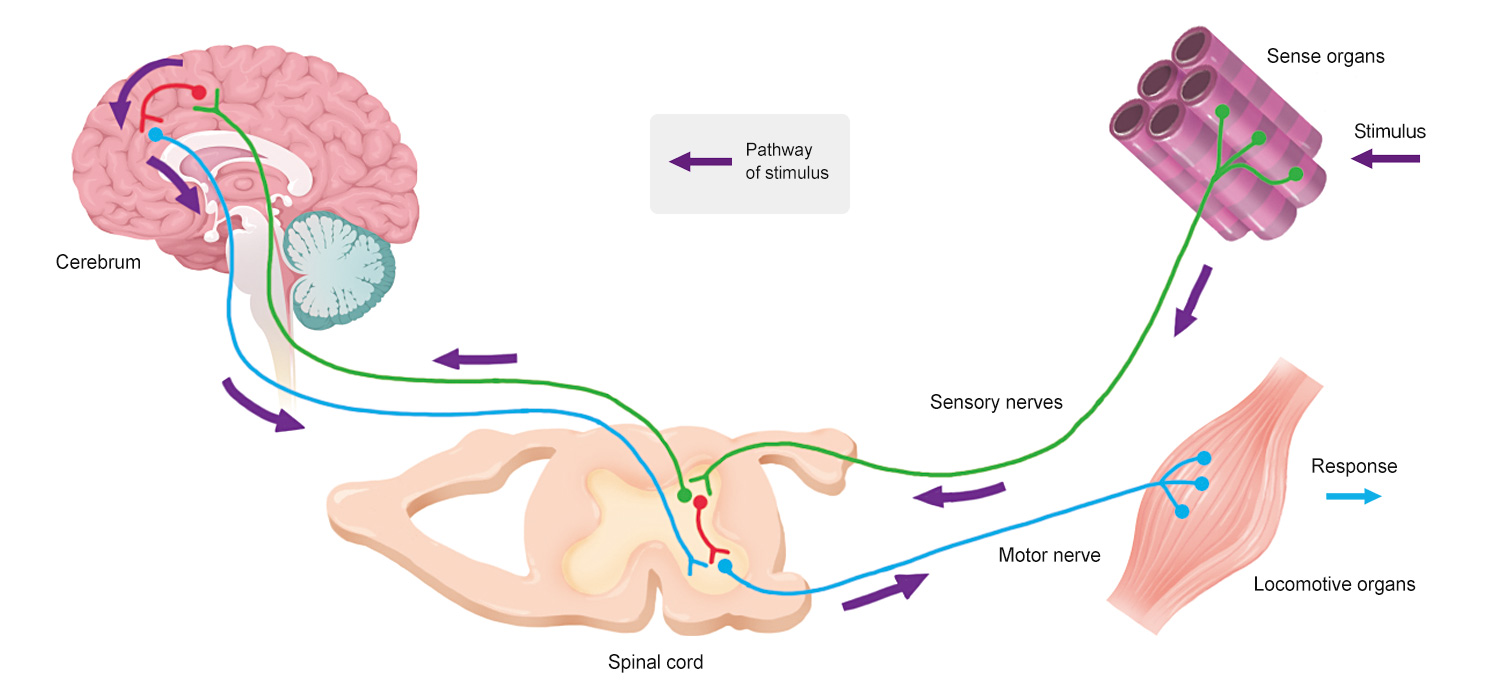Superman, our superhero in a movie that we watched when we were little! He has superhuman power. Not only can he fly freely in the sky, but he also has power to lift up a car with one hand, and excellent sight to see distant objects, and the hearing ability to hear even tiny sounds from far away; these are powers that humans can’t have. For this reason, Superman is an object of envy for children. Then what will happen if we get special power like Superman?
Appropriate response to external stimuli
Humans accept various signals and information coming from the environment through the sense organs. Then the cerebrum comprehensively analyzes them and responds to stimuli by giving appropriate commands to the muscles which are a motor organ. This is called “stimulus and response.” Not only humans but all living things have such a system.

If we can’t respond properly to external dangers, we may lose our lives. If there is no response system to stimuli, humans and other creatures are unable to survive. For example, if you don’t feel pain although you get seriously injured, you will face a more dangerous situation. In particular, humans’ ability to accept stimuli is optimized for survival.
The human body has five sense organs: the eyes which receive light (visual organ), the ears which senses vibrations like the sound (hearing organ), the nose which senses gaseous chemicals (olfactory organ), the tongue which distinguishes liquid chemicals (gustatory organ), and the skin which senses pressure, pain, warmth, and cold (tactile organ).

These sensory organs have several characteristics. We cannot feel the weight of dust, but can feel the weight of a book. The minimal level of stimulation, which is required to cause a sense organ to show response, is called a threshold. The threshold is different, depending on the sense organs or sensory cells. If the same stimulus over the threshold continues to be given, the body can no longer accept the stimulus. This is called sensory adaptation, which is why although you are exposed to a strong smell, you cannot smell it any longer after a certain amount of time passes. If you continue to give a stimulus of the same size to your sense organs, you can no longer feel it until a greater stimulus is given.
Smart sense organs which accept only what is necessary
1. Sight, smell, and taste
Is it all good to have great sensory abilities like Superman? The eyes, which are the body parts in charge of sight, accept only the visible light at a wavelength band between 380 and 780 nm. Our eyes can only see down to certain sizes. What if we could accept infrared light, UV light, or the electromagnetic wave, and see even micro objects that can be seen only through a microscope? If we can see even those many invisible electromagnetic waves, how will we be able to handle such a large amount of signals and information? We won’t be able to eat properly because of all the microorganisms, and we will have a lot of inconveniences in our daily lives. There will surely be an unbearably great deal of confusion.
The nose, which is in charge of olfactory sense, senses gaseous chemicals that is often called smells. Since gas molecules are invisible to the eye, it is very important for our body to sense what kind of gas molecules they are. If a harmful gas is inhaled into the body, the body will fall into danger, so it needs to be sensitive even to small changes of the gas. So the nose is very sensitive to the minute changes in gas molecules.
As explained earlier, the olfactory sense, which is the most sensitive sense, can easily become numb when exposed to a certain smell for a long time. As a result, our brains no longer have to be stressed out with an unpleasant odor. These olfactory characteristics are also essential for survival.
The tongue, which is responsible for palate, senses chemicals in the liquid state. There are four kinds of tastes that the tongue can detect: sweet, sour, salty, and bitter. With the combination of these tastes and the help of the olfactory sense, we can feel various tastes. Among them, especially as for the bitter taste, its threshold is so low that it makes us very sensitive to that taste. This is because the materials that harm the body usually have a bitter taste.
2. Touch and hearing
The skin which is in charge of tactile sense has four types of sensory spots that feel pressure, hot, cold, and pain. Because these sensory spots are distributed evenly in the skin, we can understand the environment we are in accurately. What state will our bodies fall into if we don’t feel pain, hot, or cold? Imagine it. We can say that we have an optimized system that adapts to the environment in various ways and copes with it appropriately.

Helen Keller, who lost sight and hearing, said, “Blindness separates people from things; deafness separates people from people.” Many people think that sight is more important than hearing, but it is said that hearing impairment reduces the quality of happiness more than visual impairment. This means that hearing is more important than we think it is.
The ears which are in charge of hearing can only hear sounds in the range between 20 Hz to 20,000 Hz, called audible frequencies. The noise of scratching a blackboard with a fingernail sounds creepy because it is the sound of high frequencies among these audible frequencies. On the contrary, people’s voices are located in the lowest audible range that can be heard, using the least energy. Sounds above 20,000 Hz, which cannot be heard with human ears, are called ultrasound. If we could hear them, we would have to hear even the sound bats or dolphins make. Being able to hear every sound is not necessarily good.

The sense of balance, which does not belong to the five senses but is in charge of the balance of the body, is in the ears which are in charge of hearing. It tells us the body’s inclination, location, speed, rotation, etc. Therefore, we can know whether our bodies are lying down or standing, or how fast we are moving even without looking.
It is absolutely necessary for our survival to know exactly what the state of our body is as well as the surrounding environment, because that allows us to make the most appropriate response and take measures.
Human sensory abilities accept only signals of the range that is most necessary for survival even though there are many signals and information, and other signals are not accepted.

In the movie Superman, we can see how Superman hides his special abilities so that he can live with people. When we think about it, we can see that human sense abilities are designed best for living. If you could see what is invisible to others and hear what is inaudible to others, you would be unable to live a normal life because of all the stress. Humans have the most appropriate sensory abilities, neither insufficient nor excessive. How were we given these abilities?